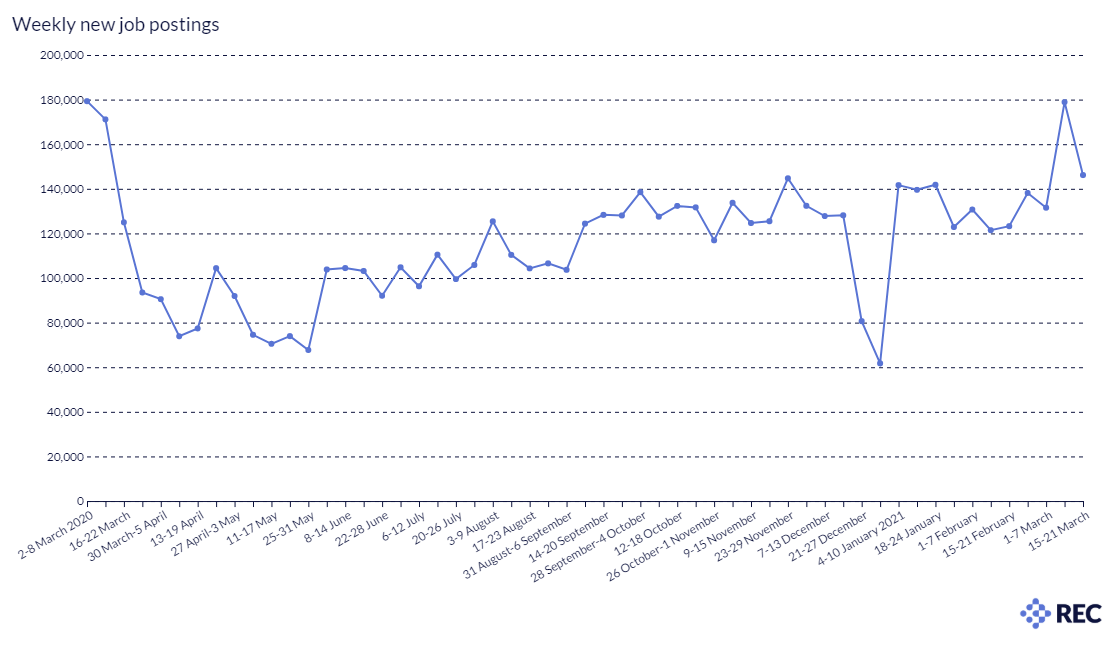- 146,000 new job adverts posted in the third week of March, giving a total of 1.29 million active job adverts in the UK
- Higher numbers of new job postings in past two weeks suggest increase in hiring as the economy starts to re-open
- Rise in job adverts for veterinary nurses, bricklayers, sales and retail assistants, as well as roles in hospitality
- East and West Dunbartonshire remained hiring hotspots in mid-March, while the biggest fall was on the Isle of Wight
In the third week of March, there were 146,000 new job adverts posted in the UK. This follows a further 179,000 in the previous week – the two highest weekly figures since the COVID-19 pandemic began. The labour market has been remarkably resilient through the latest national lockdown, and this increase in new job adverts could indicate a growing number of businesses looking to bring in new staff in the coming months as restrictions ease.
In contrast, the number of active job postings in the UK fell to 1.29 million in mid-March, a drop of 1.8% week-on-week, as more adverts expired and were removed from job sites. This churn in the jobs market is likely to reflect the changes that are taking place in the economy, as some sectors and regions grow and others struggle.
There has also been a higher proportion of job adverts for temporary roles in recent weeks – showing how important these roles are as businesses prepare to emerge from the third lockdown. Temporary roles represented around 16.3% of all active job adverts in mid-March 2021, compared to 15.1% in early July 2020 as the first lockdown was eased, and 14.0% in mid-March 2020.
Neil Carberry, Chief Executive of the REC, said:
“The fact that we have just had the best two weeks for new jobs postings since last March is a sure sign of the resilience of our jobs market, and the hard work recruiters are doing to get people into roles. There are particularly positive signs for the retail, leisure and hospitality industries, as businesses in those sectors look to prepare for re-opening. And we continue to see the importance of temporary work in helping businesses and workers get back on their feet.
“As we reach the tail end of the pandemic, job creation is returning. But it’s clear that the recovery will not recreate exactly the same economy as we had before. Pathways into work matter – especially for young people, who have been most severely affected by the last year. But so do job transitions into growing sectors that are already facing labour and skills shortages. Reforming our skills system, including the apprenticeship levy, and making the new immigration system work more effectively for our economy will be key debates in the months and years to come.”
In the third week of March the occupation with the highest increase in active job postings was veterinary nurses (+14.3%) and there were also increased demand for bricklayers (+13.6%) and therapy professionals (+9.4%).
The next phases of the government’s roadmap to ease restrictions are approaching, and it is encouraging to see growing numbers of adverts for roles in hospitality, as this sector was one of the hardest hit by restrictions. There were increases in postings for cooks (+10.1%), kitchen and catering assistants (+7.6%), bar staff (+5.8%), and hotel and accomodation managers (+5.6%) in mid-March.
There are also indications that the service and leisure industries are gearing up and preparing to re-open. Managers and directors in the retail and wholesale sector (+12.2%), sales and retail assistants (+9.7%), and sports and leisure assistants (+6.3%) were all among the top ten occupations that saw an increase in job adverts from the previous week.
On a local level, six of the top ten hiring hotspots last week were in Scotland. East and West Dunbartoshire topped the list (+4.7% and +4.4% respectively), followed by the Scottish Borders (+3.8%) and Inverclyde, East Renfrewshire & Renfreshire (+3.5%).
At the other end of the spectrum, the steepest fall in weekly job postings was recorded in the Isle of Wight (-20.5%), followed by Sefton (-10.2%) and Bournemouth & Poole (-8.9%).
Matthew Mee, Director, Workforce Intelligence at Emsi said:
“The data continues to show an upward trend in employer demand, with new postings reaching levels not seen since before the first lockdown a year ago. This suggests that many employers currently have a good degree of confidence for the future, and it is especially interesting to see a rise in demand for jobs in those industries which have been hardest hit by lockdowns – particularly retail and hospitality – an indication that many businesses in these sectors are getting prepared for re-opening. Of course we will need to continue monitoring how things develop, but this clearly shows things moving in a positive direction.”







